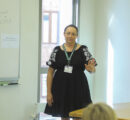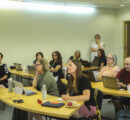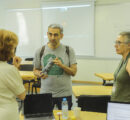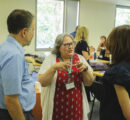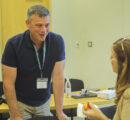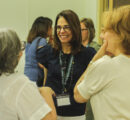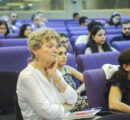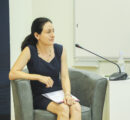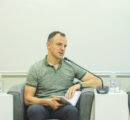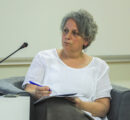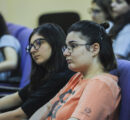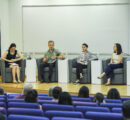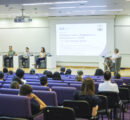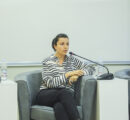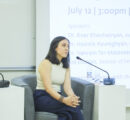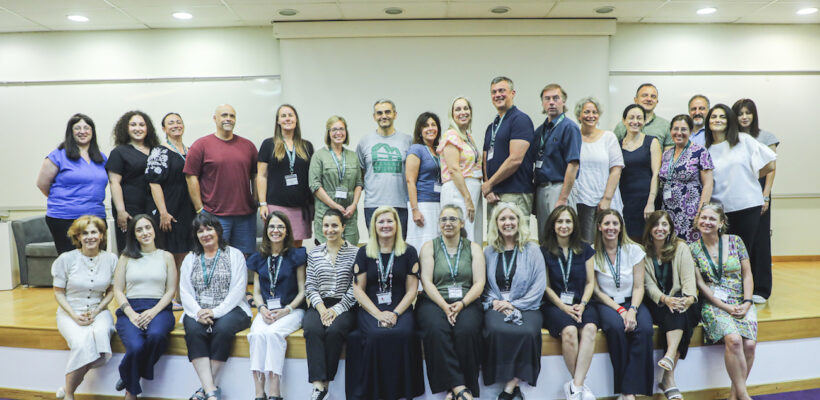
AUA and The Genocide Education Project Jointly Host Panel Discussion
3 min readYEREVAN, Armenia — On Wednesday, July 12, the American University of Armenia (AUA) and The Genocide Education Project (GenEd) jointly hosted Armenia: A Look at Progress from Independence panel discussion that examined the progress, conditions, and challenges of Armenia’s economy, political system, education sector, and civil society.
Vice Provost for Integration and Associate Professor in the Manoogian-Simone College of Business and Economics Dr. Knar Khachatryan was the first panelist. She addressed several milestones in Armenia’s economy upon transitioning to a market economy following its declaration of independence in 1991. Dr. Khachataryan then briefly examined the key economic sectors that have contributed to the country’s GDP in 2022 (such as manufacturing, trade, and agriculture), also citing the main export destinations, such as Russia and several countries of Europe. Her discussion touched upon the factors that have played a positive role in the growth of Armenia’s GDP in the last two years — global economic conditions, domestic policy reforms, as well as investment and business confidence — subsequently noting the challenges the country faces: regional geopolitical tensions, heavy dependence on remittances, uneven economic growth and poverty, and the human capital outflow and brain drain.
Speaking next was Assistant to the President on Academic Affairs and Associate Professor in the College of Humanities and Social Sciences Dr. Vahram Ter Matevosyan, who first noted that systemic development takes time, then discussed several challenges related to the development of Armenia’s political system: regional conflict, demographics (including migration and low birthrates), zigzagging of democratization, and national security. Focusing on the latter, Dr. Ter Matevosyan elaborated on several events that have impeded development, including the first Artsakh War, the 2016 Four-Day War, the 2018 change in government, and the most recent 2020 war in Artsakh.
The next panelist was Dr. Hasmik Kyureghyan, executive director and co-founder of Paradigma Educational Foundation and AUA alumna (TEFL ’12), who focused on teaching preparation and training issues, noting that only 2% of teachers are newcomers, which indicates that teaching tends to be an unattractive profession predominantly due to the low salaries. She touched upon the new requirements for ongoing professional development that were implemented to help teachers keep up to date with current developments in education and ensure quality delivery, also addressing the resultant positive impact on student learning. Furthermore, Dr. Kyureghyan discussed the nutrition program implemented by primary school students in the regions, which was installed to address one of the main barriers to learning.
She was followed by Ani Jilozian, director of development at the Women’s Support Center, who primarily focused on issues of domestic violence, one of the areas that civil society has been addressing for over several decades. Through storytelling, Jilozian highlighted several recent developments, including the 2017 passage of the Domestic Violence Law — law on the prevention of violence within the family, protection of victims of violence within the family and restoration of peace in the family — and the establishment of support centers in regions around the country.
The panel discussion, facilitated by Dean of General Education Dr. Sharistan Melkonian, was held in conjunction with The Genocide Education Project’s 2023 Teacher Fellowship Program, which brought to Armenia high school social studies educators from the United States to engage in an intensive professional development program on teaching about genocide, with a particular focus on the Armenian case. Upon returning to their home cities, the Genocide Education Project teacher fellows will develop and carry out professional training activities for colleagues who teach about genocide.
“The most effective way to put real meaning behind the phrase ‘never again’ is through education,” stated Dr. Melkonian. “And, the Genocide Education Project is leading efforts in the United States to help educators teach about human rights and genocide. We are pleased to continue to grow the partnership between The Genocide Education Project and AUA.”
Earlier in the day, AUA faculty and The Genocide Education Project fellows engaged in a discusson focused on teaching about genocide. One particular topic of discussion was the challenge of teaching about genocide while students are currently experiencing war or the consequences of war.
Founded in 1991, the American University of Armenia (AUA) is a private, independent university located in Yerevan, Armenia, affiliated with the University of California, and accredited by the WASC Senior College and University Commission in the United States. AUA provides local and international students with Western-style education through top-quality undergraduate and graduate degree and certificate programs, promotes research and innovation, encourages civic engagement and community service, and fosters democratic values.

